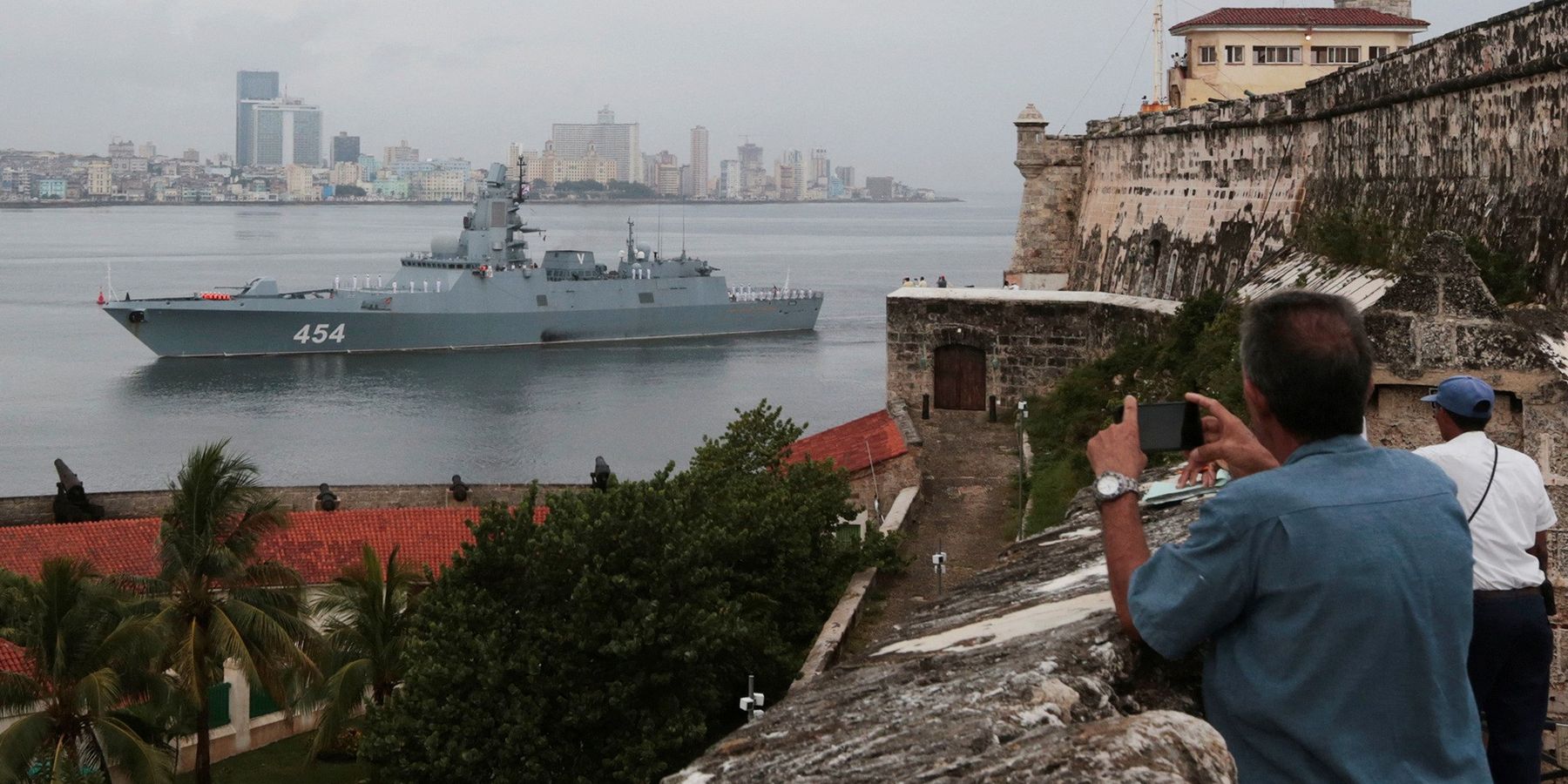The news that four Russian warships are in Havana for naval exercises brings to mind the old mariner’s aphorism, “Any port in a storm.”
Cuba is in desperate need of economic help, and Russia has been providing it. The result is a deepening partnership that has geopolitical echoes of the Cold War, although the Cubans are now drawn to Moscow less by ideological affinity than economic necessity.
Ever since the COVID-19 pandemic, the Cuban economy has been wracked by the gales of a perfect storm — a confluence of intensified U.S. sanctions imposed by President Trump, a pandemic that shuttered the tourism industry, and ill-conceived government policies that have made things worse rather than better.
Desperately short of foreign exchange currency, the Cuban government is unable to import sufficient basic necessities like food, fuel, and medicine, let alone the requisite inputs for domestic production, which has plummeted. Shrinking production means declining foreign exchange earnings from exports and an even greater need for imports — a vicious circle that has no easy exit.
Some of the economic reforms the government has undertaken may help restart the economy in the medium and long-term, but in the short run, Cuba’s only hope to alleviate the immediate crisis, to put food on people’s tables and, literally, keep the lights on, is foreign help. That’s where Russia comes in.
In the early 1960s, the assistance from the Soviet Union saved the Cuban economy from the ravages of the U.S. embargo, thwarting the plans of successive U.S. presidents to subdue the revolutionary government. The Soviets saw Cuba as a valuable ideological outpost in Latin America and Cuba saw the Soviet Union as a necessary partner in its struggles to break free of U.S. domination.
Although that partnership collapsed with the end of the Cold War, Vladimir Putin has worked hard to rebuild it ever since his first term as Russian president. His principal lever has been economic assistance. Putin forgave 90 percent of Cuba’s Soviet-era debt and has extended larger and larger amounts of economic assistance ever since. In 2009, the economic relationship expanded into the political and diplomatic spheres when the two countries declared a “strategic partnership.”
When the Cuban economy suffered an 11 percent decline as a result of the pandemic, Russia sent desperately needed food and medical supplies that saved Cuban lives — a move that rekindled the affection for Russians felt by some Cubans, especially those who studied in the Soviet Union when they were young.
Russia’s invasion of Ukraine strained the new partnership. Cuba had a close relationship with Ukraine dating from the 1990s, when it provided medical treatment to more than 18,000 Ukrainian children suffering from radiation sickness due to the Chernobyl nuclear disaster. Moreover, non-intervention and opposition to Great Power spheres of influence have been cornerstones of Cuban foreign policy and a rallying cry against U.S. policies of regime change ever since Fidel Castro rode into Havana in 1959.
At first, Cuba tried to steer a middle course on Ukraine, reiterating its opposition to intervention and calling for a negotiated end to the conflict, while at the same time blaming the United States and Western Europe for provoking Moscow by expanding NATO to Russia’s borders. At the United Nations, Cuba abstained on resolutions calling for Russia to withdraw, but opposed resolutions imposing sanctions on Moscow.
Over the past year and half, however, Cuba’s position has gradually become less equivocal and more closely aligned with Russia’s. Since President Miguel Díaz-Canel visited Moscow in November 2022, and declared “Russia is not responsible” for the war, a parade of Russian and Cuban officials have travelled between the two capitals, signing more than a dozen new economic cooperation agreements.
On a trip in June 2023, Russian Security Council Deputy Chairman Dmitry Medvedev met with Raúl Castro, who, according to the Russian news agency Tass, “expressed full support for Russia in regard to the situation in Ukraine and confidence in Russia’s victory.”
Last month, Díaz-Canel visited Moscow again and, in his meeting with Putin, repeated Cuba’s condemnation of NATO expansion, declaring, “We wish you and the Russian Federation every kind of success in the special military operation.”
The visiting Russian warships are Putin’s way of reminding President Biden that Moscow can challenge Washington in its own sphere of influence, a symbolic counterpoint to U.S. assistance to Ukraine. For the past several years, the U.S. Southern Command’s annual Posture Statement has cited the growing influence of “Strategic Competitors” — especially Russia and China — as the top national security challenge to U.S. interests in the Western Hemisphere.
On this issue, like the issue of migration, U.S. sanctions against Cuba have proven counterproductive. By exacerbating the economic hardships Cubans face, Washington’s policies have accelerated migration and left Cuba no alternative but to seek help from those same strategic competitors. As Southcom commander General Laura J. Richardson told Congress, referring to Latin America more broadly, “When you need a rope to grab, you aren’t necessarily looking to see who threw it. We must be the ones throwing the rope, not our strategic competitors.”
That, in a nutshell, is a good explanation for Cuba’s evolving relationship with Russia and sound advice for U.S. Cuba policy.
- US presidential candidates pander, then produce failed Cuba policy ›
- It's time to take Cuba off the terror list ›
- Why Cuba has threaded the Russia needle for 60 years ›
- US general wants 'Marshall Plan' to counter China in LatAm | Responsible Statecraft ›
















